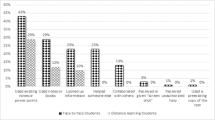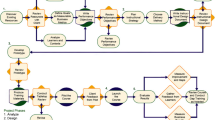Abstract
THIS PAPER PRESENTS the results of a nationwide survey of deans, associate deans, and directors who make recommendations concerning the admission of applicants to graduate programs in their colleges and universities. A questionnaire was sent to a sample of academic officers in public and private institutions describing three different types of applicants. Each of the three applicants had a bachelor’s degree in the relevant subject, good grades, similar GRE scores, and strong letters of recommendation. However, one applicant had studied in the traditional classroom and laboratory settings on campus. A second applicant had taken half of the required courses for the bachelor’s degree online and half on campus. The third applicant had taken all courses for the degree over the Internet. The question addressed by the project is whether a bachelor’s degree earned partially or fully online is equally acceptable to those who recommend students for graduate admissions. The findings indicate clearly that they are not.
Similar content being viewed by others
References
Adams, J. (2003, in press). Understanding faculty advancement and technology: An academic accomplishment index. Accepted for publication inJournalism and Mass Communication Educator.
Allen, E., & Seaman, J. (2003). Sizing the opportunity: The quality and extent of online education in the United States, 2002 and 2003.The Sloan Consortium, Needham, MA, Retrieved November 24, 2003, from http://www.sloan-c.org/resources/ sizing_opportunity.pdf.
Altschuler, G. (2001, August 5). The e-learning curve.The New York Times, p. 13.
Carnevale, D. (2002a, October 18). Online colleges complain about traditional institutions’ tough credit-transfer policies.The Chronicle of Higher Education, p. A35.
Carnevale, D. (2002b, November 8). Distance education attracts older women who have families and jobs, study finds.The Chronicle of Higher Education, p. A33.
Carnevale, D., & Olsen, F. (2003, June 13). How to succeed in distance education.The Chronicle of Higher Education, p. A31.
Kiernan, V. (2003, August 8). A survey documents growth in distance education in late 1990s.The Chronicle of Higher Education, p. A28.
Levine, A., & Sun, J. (2002). Barriers to distance education.American Council on Education, Washington, D.C.
Maki, W., & Maki, R. (2002). Multimedia comprehension skill predicts differential outcomes of web-based and lecture courses.Journal of Experimental Psychology, 8(2), 85–98.
McNamar, Q. (1949).Psychological statistics. New York: John Wiley & Sons.
Peabody, Z. (2001, September 27). College education online: Pass? Fail?Los Angeles Times Retrieved November 25, 2003, from http://www.latimes.com/technology/la-000077248sep27.story.
Phipps, R., & Merisotis, J. (1999). What’s the difference? A review of contemporary research on the effectiveness of distance learning in higher education.The Institute for Higher Education Policy, Washington, D.C.
Russell, T. (2000).The no significant difference phenomenon. Retrieved November 25, 2003, from http://teleeducation.nb.ca/nosignificantdifference/.
Symonds, W. (2001, December 3). Giving it the old online try.Business Week, p. 76.
Terry, R. (2002, September 2). Back to school: After failing their first online test, colleges and education companies are learning from their mistakes.Washington Techway, p. 29.
Twigg, C.A. (2003, September/October). Improving learning and reducing costs: New models for online learning.EDUCAUSE Review, pp. 28, 30, 32–36, 38.
Waits, T., & Lewis, L. (2003). Distance education at degree-granting post-secondary institutions 2000–2001.U.S. Department of Education Center for Educational Statistics, Washington, DC.
Young, J. (2000, February 18). Distance and classroom education seen as equally effective.The Chronicle of Higher Education, p. A55.
Author information
Authors and Affiliations
Rights and permissions
About this article
Cite this article
DeFleur, M.H., Adams, J. Acceptability of online degrees as criteria for admission to graduate programs. J. Comput. High. Educ. 16, 150–163 (2004). https://doi.org/10.1007/BF02960287
Issue Date:
DOI: https://doi.org/10.1007/BF02960287




